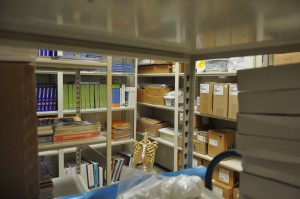
Ever wondered why you spend three weeks learning lab safety in every science class, but have never actually used a Bunsen burner? Parents are beginning to demand answers.
On Aug. 8, more than 20 Grady parents held the first Grady Science Support Team meeting, a group of parents committed to providing the support needed to ensure higher quality science education. By working directly with teachers, they plan to make an effective, meaningful and lasting impact on science education.
“I’m very appreciative … more than I can express,” science teacher Korri Ellis said. “It’s wonderful!”
According to the Georgia Department of Education’s records from 2010, Grady scored higher than the state average on the Georgia High School Graduation Tests in every subject except science. While GHSGT records show that Grady science classes have been underperforming, APS budget records reveal that science classes have been underfunded and, according to many students and parents, undervalued.
“I first noticed it second semester last year when my ninth-grader wasn’t having great lab experiences,” said Lynette Slovensky, one of the founders of the Grady Science Support Team. “Improving science had to become a priority.”
In 2012-2013, funding for high school science consumables, such as chemicals and other lab materials, was left out of the APS budget. Teachers were unable to conduct any labs that work with any substances that would be consumed in the process. In addition to the lack of resources, teachers had to deal with a lack of lab space. There are currently 11 science teachers and only eight lab rooms.
Physics teacher Jeff Cramer believes there is a more serious underlying problem than underfunding.
“I think that [underfunding] is a convenient excuse that teachers use, but it doesn’t have to be an excuse,” Cramer said. “Teachers should be able to find a way to do things.”
The Georgia curriculum includes “essential labs” that must be completed in core science classes such as biology and chemistry. According to students and parent advocates, these are not being completed in some Grady classes, which concerns many parents. Some teachers do not have the required equipment, and others do not like the lab selections.
“You know something’s wrong when all the kids are telling each other to switch out of a science class because it’s a waste of time,” Grady parent Renee Steckl said.
In an effort to determine resource needs and challenges for the science department, representatives from the Grady Science Support Team met with the entire Grady science staff this school year. At the meeting, the representatives let the teachers know that parents wish to support them.
“I’m thrilled that parents want to do this, but I think that success comes back to whether the teachers are willing to develope their lesson plans,” Cramer said. “Teacher training is the other component of this equation that is being overlooked. They have to understand the concepts and how it works.”
Because of their efforts, members of the Support Team have fostered strong relationships with the teachers and were able to brainstorm what obstacles and challenges are keeping Grady science programs from being what they could be. The parents plan to highlight what is going right and what is going wrong.
“There seems to be a substantial disconnect between what Grady students are capable of, as demonstrated in math and other subjects, and their performance in science,” Slovensky said.
Despite being a new group on the Grady scene, the Science Support Team has already accomplished a few of their many goals. The parents facilitated plumbing repairs in several science classrooms, providing teachers with the running water they’ve been missing for years. Based on parent input, Jormell Cofield, Grady’s new science department leader, was able to develop a rotating schedule to give all science teachers access to laboratory classrooms. Last semester the Support Team developed a small budget to support three additional lab experiences, including materials for frog dissection in biology classes last semester.
“Much has been accomplished by shining a light on what isn’t working and just bringing it to attention,” parent Cindy Hulbert said.
Hulbert has asked the teachers to come up with wish lists. Many teachers replied swiftly, requesting lab essentials that APS just isn’t providing its teachers.
Ben Sellers, the new astronomy teacher, and Rachel Obeidin, a chemistry teacher, were the first two teachers to reach out for assistance. Hulbert plans to help get them what they need as soon as possible by matching these wish lists with the pool of money they have collected and the money they hope to raise.
Having already made $1,500 by working the Grady parking lot, Hulbert is optimistic when it comes to fundraising. The parents are hoping for more parking-lot fundraising, PTA grants, and other corporate and organizational grants.
“If the parent group can be consistent, it could be like the college and career center,” said Cramer. “It’s taken off due to compassionate parents that have done the research and know what it takes to get things done.”
The Support Team is also providing enrichment resources for students, parents and teachers. They update a running list of summer opportunities, volunteer positions, internships and various camps on the Grady website, and they are constantly updating the Grady Science Support Team Facebook page with information on career opportunities, contests, and scholarships as well as the latest science articles for students.
“We’re providing free external resources in an attempt to get students exposed to the things they’re not getting exposed to in the classroom,” said Paige Cucchi, a parent who helped start the website last year and helps maintain the group’s active Facebook page.
Junior Tatyana Sampson took advantage of one of these opportunities this summer and studied in a biochemistry lab at Georgia Tech, where she cloned DNA from scratch.
“I just didn’t feel prepared enough in class,” Sampson said. “I learned far more there than I’ve ever learned in school. Going into a lab and experiencing it rather than just reading out of a textbook was exciting. Grady doesn’t show you the cool side of science. It’s not just sitting at a desk all day reading out of a textbook. You get to do cool stuff if you pursue science.”
This is exactly why the Science Support Team is hoping more parents will help. Parents are needed to organize wish lists, pair them with grant opportunities and other various funding sources, or further develop grant opportunities by collaborating with teachers on grant applications. The team also needs help to develop a list of expert scientists in the community. Lab materials need to be prepped, textbooks must be barcoded, and supply closets and prep rooms require cleaning.
“In order to know what the department needs, we need to know what we already have,” Hulbert said. “[In the fourth floor supply closet] there are textbooks, materials as old as the 1960’s, and stuff marked toxic … and I’m sure there are some usable things as well.”
Of course, they’re realistic about the time that change will take. In a joint effort with Grady staff, they’re hoping to be able to chip away at the challenges facing the Grady science department.
“I’m optimistic,” Cindy Hulbert said, “Slowly but surely, we’ll see things take off.”








Paige Cucchi • Sep 5, 2013 at 6:33 am
This is a great article and should serve as a call to action for parents, teachers and students to ensure Grady has a strong STEM program, including science. All the research suggests that the fasting growing occupations in the next decade will require at least some background in STEM and that our country will face a shortage of STEM trained applicants. We need to ensure we prepare our students for where the jobs are and will be.